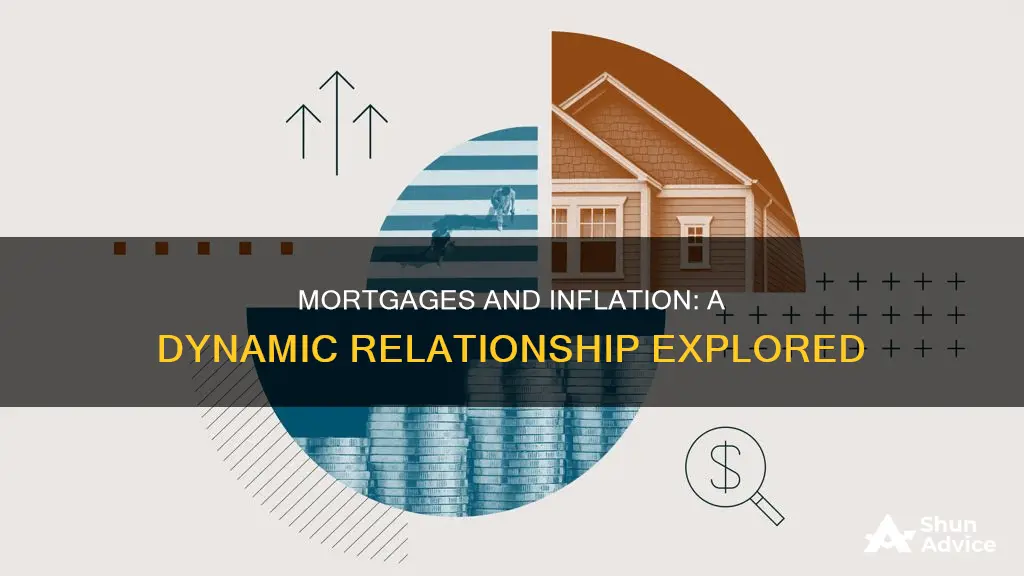
Inflation is a measure of the rate at which the costs of goods and services are rising in an economy. Inflation can lead to higher mortgage interest rates because it devalues the currency. However, mortgage contracts are specified in nominal terms and do not take inflation into account. This means that when inflation is high, the value of an outstanding mortgage is reduced directly by inflation. For example, in real terms, a £200,000 mortgage will have fallen in value by about 10%, or £20,000, with 10% inflation. Inflation can also affect the interest rate on a mortgage loan, which is influenced by factors such as credit history, income, the amount borrowed, and the size of the down payment.
What You'll Learn

How inflation impacts borrowers and lenders
Inflation impacts borrowers and lenders in several ways. For borrowers, inflation often means that common items, such as groceries and fuel, cost more, while salaries may not rise enough to match the increase in prices. This can lead to consumers reducing their discretionary spending, which could include mortgage payments. To protect themselves against the effects of inflation, borrowers may opt for a fixed-rate mortgage instead of an adjustable-rate mortgage.
On the other hand, inflation can benefit borrowers by eroding the real value of their monthly mortgage payments. In other words, borrowers will be paying off their mortgages with "watered-down" dollars. For example, a £200,000 mortgage with 10% inflation in 2022 would have reduced in value by about £20,000 in real terms.
For lenders, inflation can lead to higher interest rates on mortgages, which can increase their profits. However, inflation can also negatively impact lenders if borrowers struggle to make their mortgage payments. This can result in "bad mortgages", damaging the lender's balance sheet. To mitigate this risk, lenders can offer borrowers a range of options, such as extending the life of the mortgage or temporarily switching to interest-only payments.
From a policy perspective, understanding the impact of inflation on borrowers and lenders is crucial to addressing the issue of rising interest rates. Governments can intervene by introducing policies of forbearance, providing borrowers with more options and flexibility to manage their mortgage payments.
Overall, while inflation can have both positive and negative consequences for borrowers and lenders, it is essential to consider the specific economic context and individual circumstances when evaluating its impact.
Mortgages: Primary Residence Determinants and Their Impact
You may want to see also

The role of central banks in setting interest rates
Central banks play a crucial role in setting interest rates, which is their most influential economic tool. They use monetary policy to manage economic fluctuations and achieve price stability, with the ultimate goal of maintaining low and stable inflation.
One of the primary ways central banks influence interest rates is by adjusting the supply of money in the economy. They do this through open market operations, buying and selling securities to banks, which affects the reserves of these banks and, consequently, the interest rates they charge. When central banks want to stimulate a stagnant economy, they increase the money supply, which leads to lower interest rates and encourages borrowing and investment. Conversely, when the economy is growing too quickly and there are concerns about hyperinflation, central banks can reduce the money supply, leading to higher interest rates and making borrowing more expensive, thus slowing down economic growth.
The specific mechanism through which central banks influence interest rates is by setting a target for the federal funds rate, which is the rate at which banks lend to each other overnight to maintain their reserve requirements. Additionally, central banks can set the discount rate, which is the interest rate at which banks borrow directly from the central bank, typically for short-term liquidity needs. By adjusting these rates, central banks have a direct impact on the interest rates charged to consumers for lending products, with higher rates discouraging consumer spending and investment.
While central banks no longer manipulate the supply of banking system reserves to set short-term interest rates as they did in conventional economic theory, they continue to play a crucial role in influencing interest rates to achieve their economic objectives, such as maintaining price stability and controlling inflation. The decisions made by central banks are based on a range of factors, including the analysis of systemic risk, and are relatively independent of political pressures.
Wall Street's Mortgage Business: How It Works
You may want to see also

The effect of inflation on the cost of living
Inflation is the rate of increase in prices over a given period of time. It is typically measured broadly, such as the overall increase in prices or the increase in the cost of living in a country. However, it can also be calculated more narrowly for specific goods or services. Inflation is often quantified by tracking the cost of a "basket of goods," which is regularly updated to reflect shopping trends.
The cost of living is a challenging metric to determine, as it varies by region and demographic group. It is influenced by factors such as housing expenses, including rent and mortgages, as well as food, gasoline, and utility costs. When inflation causes prices to rise, it can impact the purchasing power of consumers, particularly those with fixed incomes or whose salaries have not kept pace with inflation. This can result in consumers having to make difficult financial choices, such as buying less, switching to cheaper alternatives, or postponing significant purchases.
Mortgages can be affected by inflation in several ways. Firstly, inflation can influence mortgage interest rates. When inflation exceeds the target rate, central banks may increase interest rates to curb inflation. Higher interest rates make borrowing more expensive, which can lead to a slowdown in the housing market as consumers may defer purchases or opt for cheaper alternatives. Additionally, existing variable-rate mortgages become more costly, impacting the financial burden on homeowners.
On the other hand, inflation can erode the real value of mortgage payments over time. In nominal terms, a mortgage contract does not account for inflation. As a result, during periods of high inflation, the outstanding balance of a mortgage decreases in real terms. For example, a £200,000 mortgage with 10% inflation in 2022 would have effectively reduced in value by approximately £20,000. This means that homeowners can benefit from inflation by paying off their mortgages with less valuable currency.
Furthermore, taking out a larger mortgage can serve as a hedge against future hyperinflation. As inflation erodes the real value of money, a borrower with a fixed-rate mortgage can benefit from higher inflation as the real interest rate decreases. However, this strategy relies on the assumption that the borrower's income keeps up with inflation.

How inflation influences the demand for credit
Inflation influences the demand for credit in several ways. Firstly, inflation reduces the purchasing power of money, leading to a higher demand for goods and services. This increase in demand can drive up prices, causing inflation to rise even further. As a result, consumers may resort to borrowing to maintain their standard of living, leading to an increased demand for credit.
Secondly, during inflationary periods, central banks often respond by increasing interest rates to curb spending and slow down inflation. Higher interest rates make borrowing more expensive, which can lead to a decrease in demand for credit as consumers take out fewer loans. However, this can also result in a slowdown in economic growth, which may not always be desirable.
Thirdly, inflation can impact the credit market through credit expansion by banks. When the money supply increases without a corresponding increase in gold or silver reserves, it leads to credit expansion, which is a form of inflation. This inflationary credit enters the economy through the credit market, increasing the overall supply of money and driving up prices.
Additionally, inflation can affect the demand for credit by influencing the consumption/investment ratio. Inflation may encourage consumers to borrow more to invest in assets that can hedge against inflation, such as real estate or commodities. This shift in preferences can lead to an increased demand for credit to finance these investments.
Lastly, inflation can impact the demand for credit by eroding the real value of debt. In the context of mortgages, inflation can reduce the value of outstanding debt. As a result, borrowers may find it advantageous to take on larger mortgages as inflation can effectively reduce the real value of their monthly payments. This phenomenon can influence the demand for credit, especially in the context of long-term loans.

The impact of inflation on the value of outstanding mortgages
Inflation affects the value of goods and services, and as mortgage contracts are specified in nominal terms, they do not account for inflation. Therefore, when inflation rises, the value of outstanding mortgages is reduced. For example, a £200,000 mortgage with 10% inflation in 2022 would have fallen in value by about 10% or £20,000 in real terms.
Mortgages can protect against future inflation, as inflation erodes the real value of monthly mortgage payments. This means that borrowers can pay off their mortgage with less valuable money. However, inflation can also lead to higher mortgage interest rates, as it devalues the currency. This is because the Federal Reserve (or the Bank of England) may increase the federal funds rate to slow down inflation, which in turn causes mortgage lenders to raise their rates.
The impact of inflation on mortgage rates is difficult to predict, as it depends on various factors, including the performance of the economy, the interest rates set by banks, and the unique circumstances of borrowers. For example, the COVID-19 pandemic caused a market downturn that impacted mortgage rates, and it was impossible to predict. Additionally, the housing market has been hot for a long time, with home prices rising faster than inflation, making it challenging to forecast if inflation will further increase prices or cool off the market.
To address the challenges of rising interest rates, governments can introduce policies of forbearance to assist both borrowers and lenders. For instance, the Chancellor Jeremy Hunt implemented a policy allowing households to switch to interest-only payments temporarily and delaying repossessions. Extending the life of a mortgage is another option to help households manage higher interest rates.
Frequently asked questions
Inflation doesn't directly impact mortgage interest rates, but the two are related. Average loan rates across the country tend to rise and fall with inflation, which means even the most well-qualified borrowers could receive a higher interest rate during periods of high inflation.
It's difficult to predict how inflation will affect the housing market. Home prices have been rising faster than inflation, so it's unclear if inflation will cause prices to rise even higher or cool off the market.
Inflation can benefit both borrowers and lenders. For borrowers, inflation erodes the real value of their monthly mortgage payments. Lenders can benefit from higher interest rates, which may lead to increased profits.
The Federal Reserve is the central bank of the United States, and it controls the federal funds rate, which is the interest rate banks charge each other for overnight loans. Mortgage rates tend to follow the direction of the federal funds rate. The Federal Reserve also creates regular inflation reports to forecast the economy's direction.
Homeowners can take several steps to prepare for inflation, such as paying off credit card debt and opting for a fixed-rate mortgage instead of an adjustable-rate mortgage. Additionally, taking out a larger mortgage can hedge against inflation by allowing borrowers to pay off their mortgages with watered-down dollars.







